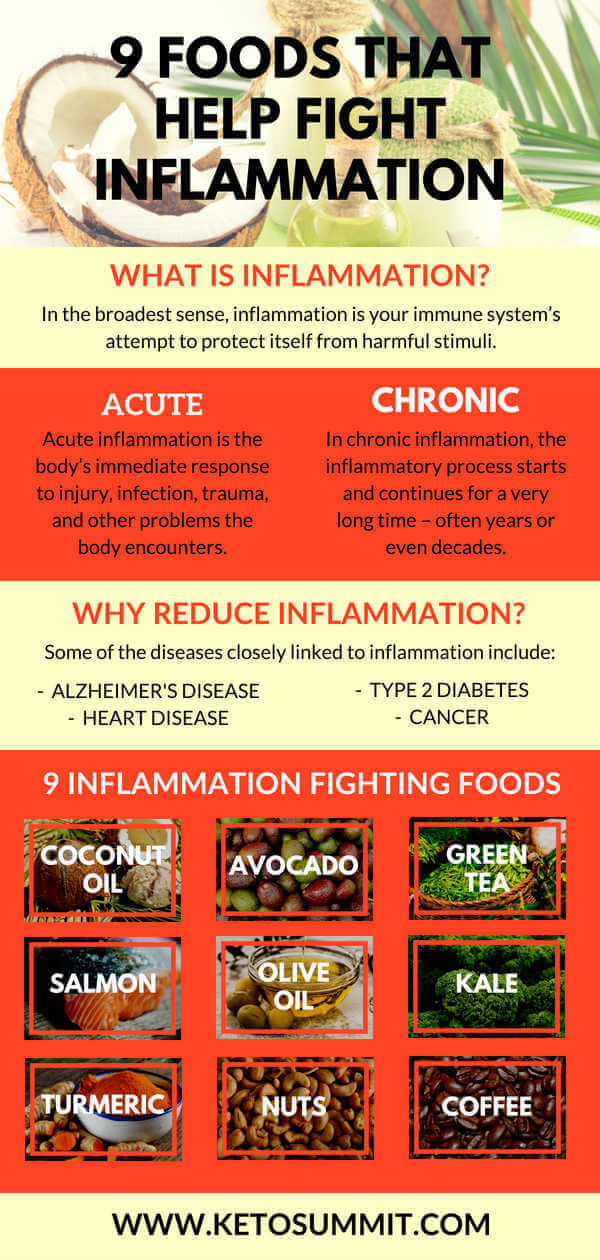9 Foods That Help Fight Inflammation
If you often struggle with pain, fatigue, or other recurring symptoms that keep you from fully enjoying life, you might have chronic inflammation.
Today we’ll explore the role different foods play in regulating inflammation when you’re following a Keto diet.
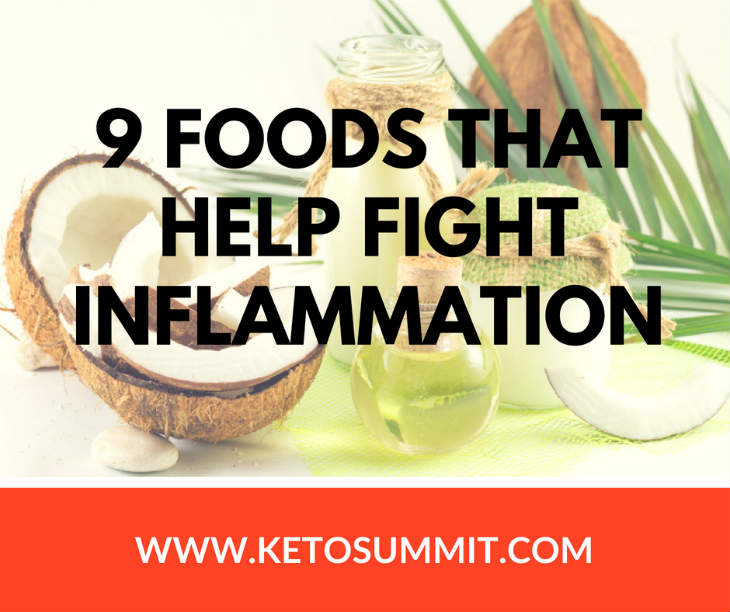
What Is Inflammation?
In the broadest sense, inflammation is your immune system’s attempt to protect itself from harmful stimuli. It’s how the body reacts to injury or exposure to harmful stimuli, such as bacteria or viruses.
Without the ability of our bodies to generate this kind of response we’d be at risk of dying from getting a papercut.
However, there is a point at which inflammation can get out of control. We’ll be talking about good and bad inflammation, and how to use food to reduce inflammation when it’s causing harm.
Inflammation Explained
There are 2 primary types of inflammation people experience:
- Acute inflammation
- Chronic inflammation
Acute Inflammation
Acute inflammation is the body’s immediate response to injury, infection, trauma, and other problems the body encounters. (1) It is a protective and vital automatic mechanism that keeps your body safe.
When we get injured on the surface of the body, whether from a bee sting or a stubbed toe, five things tend to happen:
- Redness
- Heat
- Swelling
- Pain
- Loss of function
Increased blood flow to the injured area causes redness and heat, while fluid accumulates, causing swelling. Pain is caused by chemicals that are released that stimulate nerve endings, and loss of function varies depending on the injury – for example, sense of smell is compromised when you have a cold. (2)
The acute inflammatory response is what helps wounds to properly heal, and defends the body against the threat of deadly infections. It is short in duration – typically a few days or less – and then the effects of it disappear.
Chronic Inflammation
In chronic inflammation, the inflammatory process continues for much longer. According to one recent analysis, inflammation becomes prolonged in the following circumstances: (3)
- Continued infection caused by microorganisms such as harmful bacteria or parasites
- Exposure to toxic substances that the body has trouble eliminating
- An autoimmune disorder
- Recurrent incidents of acute inflammation
- Problems within the cells: oxidative stress and mitochondrial dysfunction
According to Registered Nurse Michelle Bragazzi, BS, RN, “An acute inflammatory response to a microorganism or trauma would be considered normal and is generally short-lived (days to weeks), whereas chronic, persistent inflammation is generally triggered by additional factors over time (months to years).
While both kinds of inflammation are the result of the same immune system responses, it’s the chronic inflammation that is the source of many debilitating and deadly health problems. For this reason, we’ll be focusing primarily on chronic inflammation for the rest of this article.
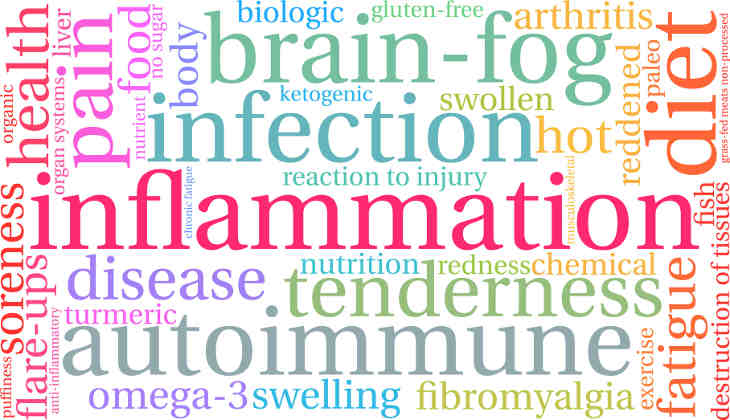
What Causes Chronic Inflammation?
The specific cause of chronic inflammation varies from case to case. As noted above, the root of the problem might be a continued infection or exposure. There are also health and lifestyle factors that seem to increase risk, including poor diet, smoking, stress, and intestinal dysbiosis. (4, 5, 6, 7)
According to Kelly Brogan, M.D., chronic inflammation and it’s effect on the brain are tied to the health of the gut. She says, “Our immune systems are largely housed in the gut and the interplay between the gut and the brain is a complex and profoundly important relationship to appreciate.” She indicates that sugar, chemicals, pathogens, and stress are at the root of long-term inflammation.
Eating the wrong foods, stress, and overexertion resulted in chronic inflammation for Amy Shah, M.D. Even exercise can be a source of stress if done to excess. Dr. Shah says, “As I started to gain a little weight, I started exercising harder. But when I didn’t see immediate results I pushed myself even more—sometimes running for hours a day. It was a stress-inducing exercise regimen instead of stress-reducing.”
Chronic inflammation is highly associated with autoimmune disorders, such as lupus, rheumatoid arthritis, and Crohn’s disease. (8) In some cases, it can be difficult to tell if the inflammation caused the autoimmunity or vice versa. What’s clear though is that there is a lot of overlap between them.
How Is Chronic Inflammation Diagnosed?
Some of the most common signs pointing to a chronic inflammatory response in your body include the following: (9)
- Pain
- Fatigue and insomnia
- Mood problems, such as depression and anxiety
- Digestive problems
- Weight gain
- Frequent infections
Anyone of these things might make you decide to see your doctor. However, you’re not likely to hear from your doc that you have chronic inflammation (even if you do). It’s not commonly diagnosed, perhaps because there are no single highly effective ways to test for it. (10)
For many, the first true indication that their immune system is out of balance is a diagnosis of another medical condition that is known to be related to chronic inflammation. Examples of these are diabetes, heart disease, or autoimmune disorders.
Why Should You Reduce Inflammation?
Researchers, scientists, and doctors have long been aware that inflammation is associated with several diseases. However, the evidence is now pointing to the idea that long-term inflammation is actually the cause of many diseases. (11)
Some of the diseases closely linked to inflammation include:
- Heart Disease: For decades, cholesterol has been the factor blamed for negatively impacting heart health, but recent studies have pointed to inflammation as the driving force of cardiovascular disease. (12, 13)
- Alzheimer’s Disease: It’s been discovered that patients treated long-term with inflammation-reducing drugs are at less risk of developing neurodegenerative diseases such as Alzheimer’s. (14) There is still much research to be done in this area, but some scientists believe inflammation may actually cause or contribute to the development of this disease.
- Type 2 Diabetes: Chronic inflammation has been directly linked to insulin resistance in recent studies. (15, 16) Some scientists are evaluating the effects of anti-inflammatory drugs for the treatment of diabetes, and it appears some medications currently used to treat diabetes actually reduce inflammation. (17)
- Cancer: Recent research has proven long-held suspicions that many cancers are caused by inflammation. (18, 19) In fact, up to 20% of cancers are caused by chronic infections, which trigger the inflammatory response in the first place. (20) Listen to Dr. Boz’s story.
Beyond this, inflammation can cause you to age faster, it can cause your bones to be more brittle, increasing your risk of fracture or breakage, and it can even lead to an early death. (21, 22, 23)
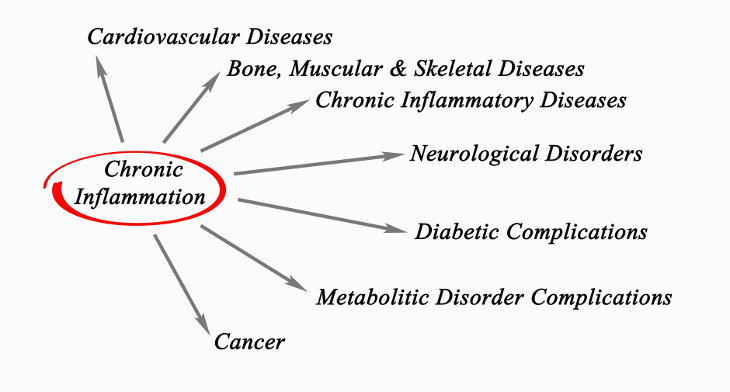
To relieve the symptoms associated with chronic inflammation, doctors can prescribe from a wide variety of medications, like nonsteroidal anti-inflammatory drugs and corticosteroids. However, these medications come with their own array of side effects.
We believe there is another way, though, and science agrees with us…
How Does Keto Help Reduce Inflammation?
Following a Ketogenic diet could be the key many people are missing when it comes to reducing chronic inflammation and the risks that are associated with it.
Here are some of the many ways in which a Keto diet can achieve a reduction in inflammation…
- A Keto diet naturally eliminates foods containing inflammatory ingredients. Many foods in a standard westernized diet are actually extremely bad for your overall health. Foods like refined carbohydrates, processed sugars, grains, and industrially refined oils can all trigger an inflammatory response in your body. (24, 25, 26, 27) Taking these foods out of the equation can help to reduce inflammation. (28)
- The NLRP3 inflammasome is a complex of chemicals that trigger inflammation and has been linked to autoimmune diseases. (29) This inflammasome can be blocked by beta-hydroxybutyrate, a ketone body found in the blood of people who are in ketosis. (30)
- Scientists have been studying the effects of a protein complex in the body called Nuclear Factor Kappa B (NF-κB), which plays an important role in the development of inflammation. (31) A ketogenic diet works to reduce the levels of NF-κB in the body, which reduces inflammation. (32)
9 Keto-Friendly Foods That Help Fight Inflammation
In addition to simply avoiding foods that cause inflammation, you can also choose to eat foods that actively fight this problem as well.
Below we’ve outlined some fantastic choices and given you a few recipe ideas to get you started.
1) Coconut Oil
Nutritional Info
Serving Size: 1 tablespoon
Amount Per Serving: Calories 121, Fat 13 g, Carbohydrate 0 g, Protein 0 g
Among the legion of recognized benefits of coconut oil, it’s also anti-inflammatory. Virgin coconut oil is best, as the refined versions have been stripped of important nutrients. (33)
One easy and delicious way to get more coconut oil into your diet is to whip up some of these great Keto fat bombs.
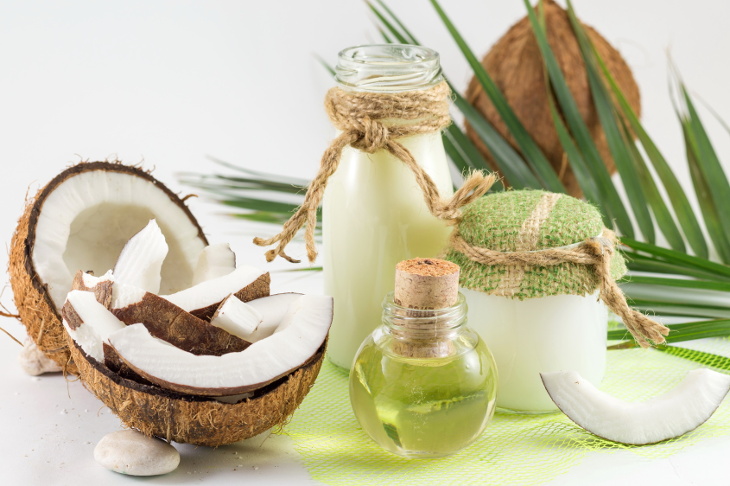
2) Avocado
Nutritional Info
Serving Size: 1 cup of cubed avocado
Amount Per Serving: Calories 240, Fat 22 g, Carbohydrate 13 g (Net Carbs 3 g), Protein 3 g
Research shows that avocados have many health benefits – they are dense in vitamins C and E, monounsaturated fatty acids, and carotenoids lutein and zeaxanthin, making it the perfect food to cool inflammation. (34, 35, 36)
Avocado toast is definitely off the menu on Keto, so how to get more avocado into your diet? Take a look at this list of 33 awesome Keto avocado recipes.
3) Green Tea
Nutritional Info
Serving Size: 1 cup of brewed tea
Amount Per Serving: Calories 2, Fat 0 g, Carbohydrate 0 g, Protein >1 g
Green tea is highly effective for increasing antioxidant levels and protecting the body from chronic inflammation. It helps to regulate chemicals that trigger inflammatory responses, proving to be remarkably beneficial for the body. (37)
Some people aren’t fond of traditionally brewed green tea but don’t worry, we’ve got you covered. Instead of steeping tea leaves, try making this delicious and creamy matcha green tea latte for your daily dose of good health.
4) Salmon
Nutritional Info
Serving Size: 3 oz
Amount Per Serving: Calories 108, Fat 3.75 g, Carbohydrate 0 g, Protein 17.4 g
Omega-3 fatty acids are fantastic anti-inflammatory compounds, and salmon is rich in these. Dozens of studies with hundreds of participants have shown omega-3’s to be powerful against inflammation and chronic disease. (38)
Be careful to choose wild-caught over farmed fish, though! While both have the omega-3 fatty acids, wild-caught salmon is more nutritious and less likely to contain harmful pollutants and antibiotics. (39)
Fish might seem tricky to prepare, but it really doesn’t have to be. Try this simple recipe for Keto Lemon Baked Salmon.
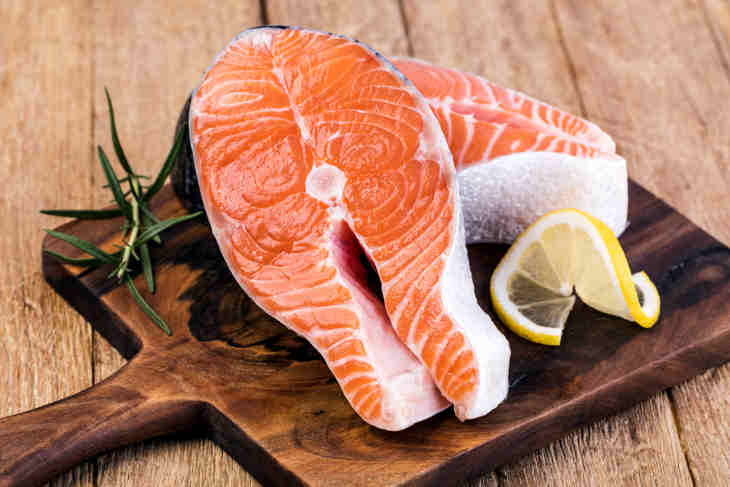
5) Olive Oil
Nutritional Info
Serving Size: 1 tablespoon
Amount Per Serving: Calories 119, Fat 13.5 g, Carbohydrate 0 g, Protein 0 g
Olive oil is high in antioxidants, making it a healthy addition to a Keto diet. It’s been studied in conjunction with a Mediterranean style of eating and has been shown to help lower inflammation. (40, 41)
Use olive oil to make salad dressings or stir-fry veggies. A great way to round out a healthy Keto meal is this quick asparagus sauté recipe.
6) Kale
Nutritional Info
Serving Size: 1 cup
Amount Per Serving: Calories 7, Fat 0.3 g, Carbohydrate 0.9 g (0 net carbs), Protein 0.6 g
Certified Nutrition Specialist and Personal Trainer Lissette Anovick recommends kale and other green leafy veggies for their anti-inflammatory benefits, stating they are “rich in flavonoids (powerful, plant-based antioxidants) that restore cellular health, which is essential to stopping inflammation.”
Kale is indeed one of the most nutrient-dense foods you can eat, and research backs the anti-inflammatory benefits. (42, 43)
It’s easy to work more kale into your diet, in salads, breakfast dishes – even muffins!
7) Turmeric
Nutritional Info
Serving Size: 1 teaspoon
Amount Per Serving: Calories 9, Fat 0.1 g, Carbohydrate 2 g (net carbs 1.3 g), Protein 0.3 g
Turmeric has numerous health benefits. While it’s now gaining popularity in the western world, turmeric has been used in India as a spice and for medicinal purposes for thousands of years.
Research has shown that turmeric contains compounds called curcuminoids that are both antioxidant and anti-inflammatory. (44, 45, 46) When cooking with turmeric it is best to add black pepper to the mix; this increases your body’s ability to absorb the curcuminoids, the most widely studied of which is curcumin. (47)
Registered Dietician, Sharon Collison, MS, RD, LDN, CSSD states that, “Evidence continues to mount in support of curcumin’s role in inhibiting the inflammatory process and, thus, inflammatory diseases.”
There are plenty of things you can do with this amazing spice! You can add it to soups and curries, salad dressings, drinks, or sprinkle it on eggs. Here is a list of 5 ways to get more turmeric into your diet.
You can also supplement with turmeric easily. We created a supplement called Turmeric Soothe that contains black pepper extract for increased absorption.
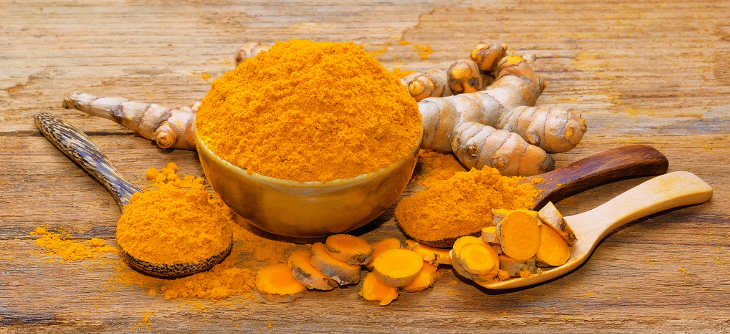
8) Nuts
Nutritional Info
Serving Size: 2 oz, shelled
Amount Per Serving: Calories 371, Fat 37 g, Carbohydrate 7.8 g (Net Carbs 4 g), Protein 8.6 g
Like salmon, walnuts are a great source of omega-3 fatty acids, in the form of alpha-linolenic acid (ALA). This may account for some of their anti-inflammatory properties. (48) Walnuts also contain antioxidants, making them a powerful ally against cancer. (49)
Walnuts are versatile – perfect on their own as a snack or else added to your favorite Keto dessert. Feeling adventurous? Try these cardamom orange walnut truffles.
9) Coffee
Nutritional Info
Serving Size: 1 cup
Amount Per Serving: Calories 2, Fat 0 g, Carbohydrate 0.2 g, Protein 0.3 g
Both coffee and caffeine have been studied for their anti-inflammatory properties.
The results of one study suggest that the anti-inflammatory benefits of coffee are amplified with increased roasting levels. (50) Other studies have shown beneficial effects of caffeine for reducing or preventing inflammation. (51, 52, 53)
Coffee doesn’t have to be boring on the Ketogenic diet. In fact, you’ll be surprised at the smooth, velvety taste you can extract from these Keto coffee recipes.
Fight Back Against Inflammation With a Keto Diet!
Maximize the anti-inflammatory benefits of Keto by choosing foods that are also proven to fight chronic inflammation.
Make these 9 foods staples in your healthy Keto diet and you’ll stand the best chance of eliminating the downstream effects of inflammation from your life.
Pinterest Image For 9 Foods That Help Fight Inflammation
Please pin the image below so that you and others can quickly and easily refer to the list and find out which foods you should be eating to ward off inflammation in the body.
